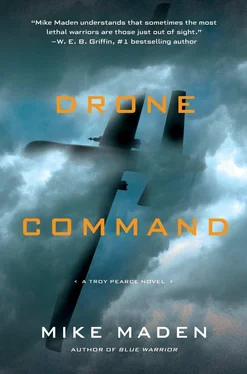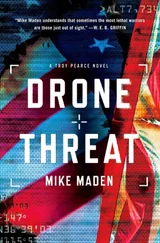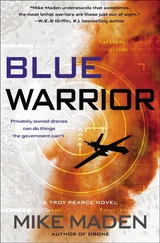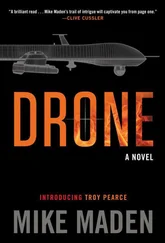The Wu-14 was China’s most advanced missile warhead and a true “carrier killer.” Launched on top of the DF-21 medium-range mobile-missile platform, the maneuverable Wu-14 warhead could fly at ten times the speed of sound, nearly eight thousand miles per hour. No nation in the world, including the boastful Americans, possessed a missile defense system that could stop the highly maneuverable vehicle at those speeds. One Wu-14 launched from a DF-21 or, for that matter, a submarine launch tube or some other platform could take out an entire American aircraft carrier, the strategic center of America’s power-projection capabilities.
Vice Chairman Feng understood that the Wu-14 wasn’t just another missile capable of taking out a large target. It was what the Americans called a “revolution in military affairs.” The United States dominated the globe and fought its far-flung wars primarily through its power-projection capabilities, which were entirely dependent upon its navy, and the heart of the United States Navy was its aircraft carrier battle groups. Before World War II, the battleship was seen as the predominant naval weapon, and few admirals anywhere in the world saw the potential of the aircraft carrier, in part because they couldn’t appreciate the strategic value of aircraft operations. From Pearl Harbor forward, it would be aircraft carriers that would dominate the ocean battle space.
Until now.
The Wu-14 would make the twelve-billion-dollar Gerald R. Ford —class aircraft carrier, and all those like her, obsolete. That meant the Americans could be stopped cold virtually anywhere in the Pacific, opening up the South and East China seas to Chinese dominance. It meant the end of Taiwanese independence, too. The end of all Western meddling in Chinese affairs.
The end of the aircraft carrier also meant the beginning of China’s rebirth as a great-power nation. Perhaps the greatest, given America’s precarious economic and political condition. Ironically, China was now hell-bent on building four aircraft carrier groups of her own, beginning with the refurbishment of an abandoned Soviet aircraft carrier, the Riga , which the PLAN named the Liaoning . It was now fully operational after nearly a decade of work and training. At least the PLAN was smart enough to know that such carrier groups would only be effective against weaker naval powers like the Philippines.
“The Americans will withdraw from our waters the first time we threaten to take out one of their aircraft carriers. The East China Sea will be completely ours again, and rightfully so,” the old missile general said. His green digital camouflage battle-dress uniform didn’t accommodate the fistfuls of medals he’d earned over the years, though none in wars, of course. His last general’s star was earned the new way — with cold, hard cash transferred to one of Feng’s offshore accounts.
“The new gas and oil reserves we’ve found there will be ours as well,” Feng said.
“Yes, those too. Most necessary,” the general said. “For the future of our country, of course. There’s untold wealth in those waters, is there not?”
Feng saw the hope washing over the old general’s rheumy eyes. He’d seen it many times before.
“Yes. Untold wealth.”
Vice Chairman Feng had risen through the ranks of the state oil ministry before joining the state-owned company, China National Petroleum Corporation, the largest energy company in China. Many of his relatives worked for CNPC as well and had amassed great fortunes from their endeavors. Feng had left CNPC several years ago to fulfill his political ambitions, but he kept his hand in the family business and an eye on all things gas and oil related.
“Of course,” Feng added, “that wealth will be shared among the people in the most equitable means possible.”
General Chen’s eyes gleamed. “Yes, of course.” Feng couldn’t have said it any plainer. The general was already calculating the potential amount of his share.
Feng understood that the general and his cronies were as greedy as the capitalists they derided, and leveraged it to his advantage. Admiral Ji, on the other hand, was a notable exception — utterly incorruptible. And like most true patriots, Ji was deeply resented by pragmatists like General Chen. No matter. Today’s deal cemented the uncomfortable alliance between the three of them, the last piece of Feng’s elaborate puzzle.
The general laughed. “Those American bastards will run like scalded dogs when the Wu-14 smashes one of their carriers!”
Feng nodded outwardly, but he didn’t share the general’s enthusiasm for war. Wars were inherently unpredictable, and unpredictability was bad for business. Better never to fight them, if possible.
“I thought the supreme art of war was to subdue the enemy without fighting,” Feng said, quoting China’s most famous military strategist, Sun Tzu.
“The Americans don’t believe the Wu-14 is fully operational. We may have to use it against them to prove it works.” The general sneered. “It would serve them right.”
“They don’t believe the Wu-14 works because their hypersonic program is a failure.” Feng resented the arrogant Americans as much as General Chen did.
“They forget that we invented the rocket!” Chen’s eyes bulged. “Maybe it’s time we showed them we know how to use them, too.”
“I hope it never comes to that,” Feng said. An actual shooting war with the Americans would be a disaster. Everything Feng hoped to accomplish wouldn’t require one. Just the threat of a fully operational Wu-14 would be enough to knock the Americans back on their heels.
“Merely a conjecture,” Chen said.
“Admiral Ji is waiting for my phone call. Is there any reason I shouldn’t make it?”
The old general smiled, but not from happiness. His obsequious grin was a practiced defense against apex predators like Feng, spots on a lizard hiding in the shadow of a falcon.
“The transfer of the Wu-14 to Admiral Ji and the PLAN has caused great concern among many of my colleagues in the Second Artillery Corps. They fear President Sun may transfer all of our missiles to PLAN control. But then again, they fear many other things about President Sun, as you well know.”
“As well they should,” Feng said. He was sympathetic to the military’s plight and was, in fact, their staunch defender. President Sun’s New Direction policy had embarked on a program to slash China’s defense budget and cut its conventional forces in half, all in the name of economic development. In reality, President Sun and the Party feared a military coup, and rightly so. Having abandoned Communist ideology in favor of capitalist development, the Party resorted to jingoistic nationalism and expansive military budgets to bolster its credibility, but in so doing created a dangerous new political force among the nationalistic officer corps, Admiral Ji chief among them.
The Party also feared a popular uprising from below, fueled by decades of corrosive political corruption and gross income inequality. The New Direction promised sweeping anticorruption reforms to restore legitimacy in the eyes of the people.
But Sun’s New Direction created enormous anxieties among the corrupt political elites who stood to lose under his anticorruption reforms, and seething resentments within the military ranks who viewed the impending defense cuts as treasonous. Vice Chairman Feng exploited those same anxieties and resentments to build a powerful coalition he believed would soon push Sun aside and win him the presidency. China was dancing on the knife’s edge, and Feng was planning on picking up the pieces whichever way they fell.
“My colleagues in the Second Artillery Corps are fully prepared to cooperate with our comrades in the navy,” General Chen said. But there was hesitation in his voice.
Читать дальше












